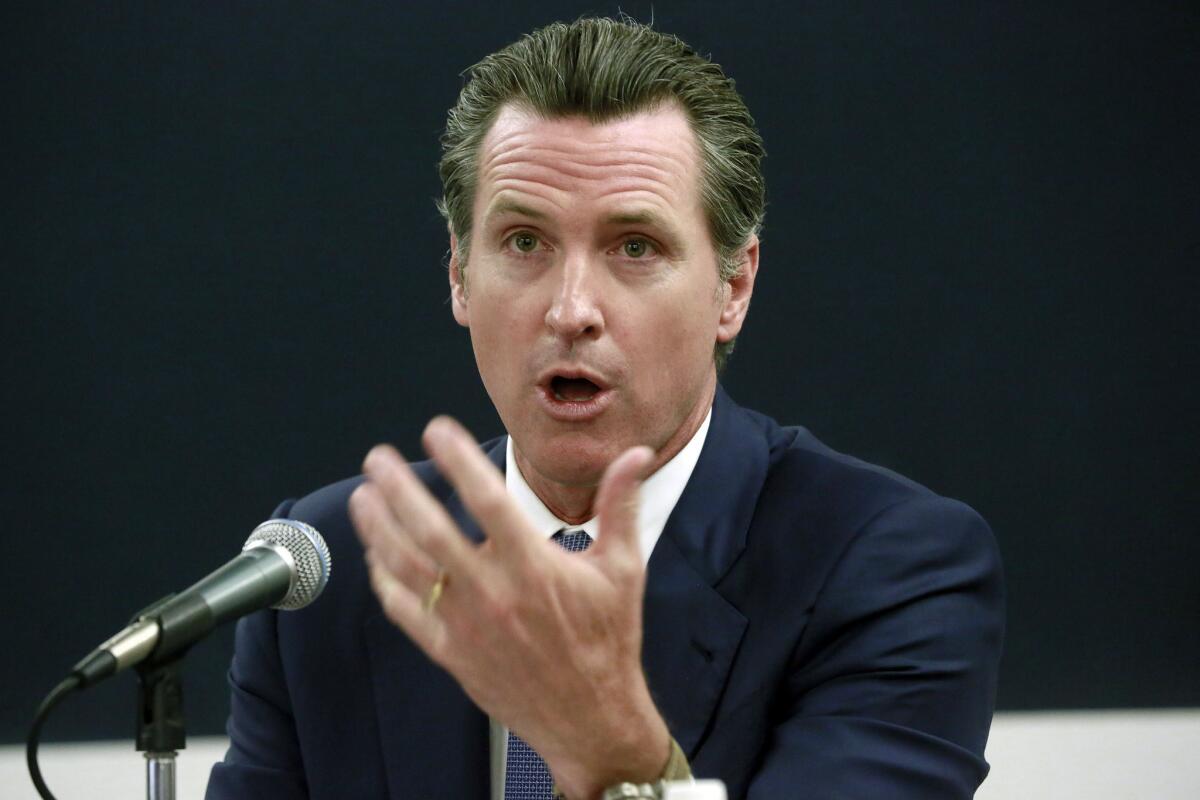Newsom proposes new vaping tax based on a product’s nicotine content

SACRAMENTO — Alarmed by an epidemic of youth vaping, Gov. Gavin Newsom on Friday proposed a new California tax on electronic cigarette products that use nicotine and threw his support behind a legislative plan to ban all flavored tobacco sales by the end of this year.
Newsom is proposing an additional tax based on nicotine content that would be $2 for every 40 milligrams of nicotine in a product, which the governor said is equivalent to the tax on a pack of cigarettes. Included in Newsom’s proposed state budget for 2020-2021, the levy would be implemented beginning Jan. 1, 2021, and requires approval by the Legislature.
In announcing the plan, the governor cited a spike in vaping by teens that was highlighted in a recent federal report that estimated 5 million middle- and high-school students reported using e-cigarettes in a recent 30-day period, a significant increase from 3.6 million the year before. Experts say the new tax could make vaping products financially out of reach for some young consumers.
“It scares the hell out of me as a parent, hearing what I am hearing — what is happening in middle schools, not just high schools — and I think this vaping tax is long overdue,” Newsom told reporters at the Capitol, where he released his budget.
Newsom’s proposal was unveiled just days after the Trump administration announced a partial ban on flavored vaping products and California legislators introduced a bill to permanently prohibit the sale of all flavored tobacco at retail stores. The state proposal would extend to menthol-flavored products, which are not covered by the Trump administration’s plan.
The lead author of the bill, Sen. Jerry Hill (D-San Mateo), welcomed the governor’s endorsement of a ban on flavored products, which he called “the gateway to youth smoking and addiction.”
On Friday, Newsom praised state lawmakers for their bill, noting that the state would “do more than the federal government did on the flavors.”
Tony Abboud, executive director of the Vapor Technology Assn., which represents the industry, said Friday that his group shares the governor’s concerns about youth vaping, but objects to taxing proposals it regards as unfair.
“It is important to ensure that the taxing of vapor products does not exceed that of similar age-restricted industries such as tobacco, alcohol and cannabis,” Abboud said. “Given the enormous costs on California’s healthcare system caused by smoking, no sound tax policy should encourage smoking and, at the same time, discourage vaping.”
Tobacco products already face state taxes totaling $2.87 per pack of cigarettes in California, and the tax extends to products used for vaping. But vaping products are taxed at the wholesale level before the products are marked up in price for retail sale, so some groups say they are undertaxed compared with cigarettes.
The new vape tax would be in addition to the current tobacco tax.
The new tax is expected to generate $32 million for the last half of the next fiscal year and the money will go to enforcement, youth prevention and heathcare workforce programs, according to the governor’s budget.
Four other states — Kansas, Illinois, Delaware and Connecticut — as well as the District of Columbia, also have taxes specifically targeting vaping products, while other states have general taxes on tobacco.
Newsom’s proposals were lauded by Jim Knox, managing director for the American Cancer Society Cancer Action Network in California.
“Typically, a tax increase will deter usage,” Knox said. “I think it’s a promising tool, but I think the really big thing is getting the flavored tobacco off the shelves.”
A coalition of government officials and health groups formed to push for a statewide flavored tobacco ban applauded the governor’s announcement, saying in a statement that the proposal comes “while the Trump Administration plays electoral politics with the health of our children by advancing half-measures on e-cigarettes.”
More to Read
Sign up for Essential California
The most important California stories and recommendations in your inbox every morning.
You may occasionally receive promotional content from the Los Angeles Times.











